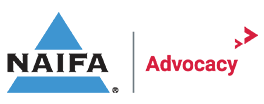

- Member Home
- Advocacy Guide Home
- IFAPAC
- Grassroots





You know the importance of managing risk. You do it every day. You manage risk related to the length of life, disability, retirement, health, and investments. You have seen the danger of failing to prepare for the future, and you understand how damaging it can be to your business and, most importantly, your clients. Political risk - the risk your profession faces from the federal and your state governments is just as real. This is why managing your political risk is so critical.
Political involvement protects against policies that undermine the insurance and financial services industry and is the best way for advisors and agents to get involved is IFAPAC.
There is no better way to protect yourself and your business from political harm than to help elect lawmakers who know that they have a powerful constituency of insurance and financial services professionals who are politically aware and actively involved in public policymaking. NAIFA members must invest in efforts to protect themselves against political risks just as they would invest to protect themselves. As IFAPAC Chair, your job will be to help your fellow NAIFA members mitigate their political risk by joining IFAPAC.
Citizens and organizations should inform elected officials of the probable impact of their legislative decisions. There is a need not only for individual involvement in government but for organized involvement as well. To participate successfully in governmental processes, however, NAIFA and the state associations must meet certain objectives. Among them is supporting candidate campaigns.
Running for political office costs money. The cost is increasing rapidly and steadily. It costs money to become known to voters and to identify and debate issues. It costs money to purchase advertising in the media, to mail literature, to travel about the state or district, to pay for polling, and so on through a long list of necessary expenditures.
There are two major ways in which organizations can support those seeking office. The first is to make available expertise and perspective unique to their industry. The second is to provide funds to the campaigns of candidates deemed worthy of support.
Individuals have three critical opportunities for participation in the selection and subsequent election of candidates. The first is contributing funds through Political Action Committees representing their interests. The other two opportunities — our vote and our personal involvement in campaigns — usually are exercised only after a candidate becomes visible enough to attract our interest and support.
The role of an industry PAC, such as IFAPAC, has become increasingly important because of revisions in federal (and some state) laws governing campaign financing. It is important to emphasize that political action committees are required by law to make full public disclosure of receipts and expenditures. NAIFAPAC (the federal part of IFAPAC) must make a complete record of contributors giving $25 or more per year and must report to the Federal Election Commission on all contributions of more than $200 per year. In addition, a PAC must report every contribution it makes to a candidate for federal office. All Federal PACs are limited to a maximum direct contribution of $5,000 to any candidate campaign in any election. (Primary, general, and run-off elections are considered separate in the application of this requirement.)
Although some candidates have a policy of accepting no contributions from PACs, the great majority of those seeking office is honored to accept help from NAIFAPAC. Two reasons for this are the reputation of the association which NAIFAPAC represents, and the fact that its activities always have been conducted as the law and regulations prescribe.
Your PAC is one of the most widely recognized and respected organizations of its kind in the nation. The number and frequency of requests to NAIFAPAC for help, from candidates and political parties, attests to this.
PACs are mechanisms for countering forces that might otherwise insulate us from the political process. PACs encourage individual involvement. They link responsible individuals to legislators within a specific business community or profession. Each individual and each industry has an opportunity and, indeed, a responsibility to participate in the American political system by supporting candidates who will consider fairly the issues affecting them.
By participating in the process through which candidates become officeholders, NAIFA members have earned the right to be heard and heeded on legislative issues at the national and state levels of government. The lawmakers have learned more about us and we have learned more about them. A word of caution should be sounded, however, to those (such as IFAPAC chairs) who are working to encourage participation in IFAPAC and to increase member understanding of the political system—the legislative activities of the associations should not be related directly to the political contributions made by the PACs. The federal and state legislative committees of the state and national associations have full responsibility for the lobbying programs. The political action committees have full responsibility for contributions to candidates. The distinction should be maintained and explained. Different laws and regulations govern lobbyists.
IFAPAC exists for one reason: to support the campaigns of state and federal candidates for elective office who understand issues important to insurance agents and financial advisors. It’s important that you communicate this simple, yet vitally important, message to your members. Many don’t know what IFAPAC does or are under false impressions. The better your members understand IFAPAC, the more likely they are to contribute.